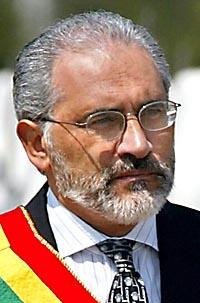Bolivian Congress rejects president's resignation
Carlos Mesa and main leaders of the National Parliament reached an agreement

Bolivia's Congress agreed on Tuesday night to reject President Carlos Mesa's resignation after political leaders reached an agreement to sign a “social deal”, which would allow the embattled head of state to stay in power. In a statement before congressmen, Mesa thanked support from his followers and promised to go ahead with the contents of the deal, as asked the population to rally against road blockades that paralyzed the country during the last weeks.
Mesa had offered his resignation to the Parliament on Monday, as an attempt to regain some political initiative after weeks of social turmoil and threats of separatism coming from the oil-rich eastern regions of Santa Cruz de la Sierra and Tarija. Mesa said the recent protests by a variety of political and social organizations were "blocking the country” and making governance impossible.
Congressmen unanimously ratified the President in his post, after most of political factions signed a comprehensive deal which covers the most controversial issues that has split this South American nation. The document, which has not been signed by the leftist Movement to Socialism, the second largest group in the Parliament, compels the Congress to call on a constitutional assembly to deal with the autonomies and to vote a new hydrocarbon law to regulate the exploitation of country's vast oil and gas reserves.
Since coming to power, Mesa has been plagued by relentless street protests, including calls for greater autonomy by Santa Cruz, Bolivia's wealthiest province, demands to lower fuel prices and hike taxes levied on foreign oil companies from 15 percent to 50 percent of their sales. The protests have highlighted the faultlines in the nation of 9 million people, already plagued by tensions between an Indian majority wielding new political clout in La Paz and a traditional white and mixed-race business elite.
Mesa accused leftist social leaders of blocking national economy, but asked them to join “country's efforts to live in peace”. Strikes and road blockades led by indigenous, social and union leftist leaders harassed Mesa, who finally found support in the Congress and could mobilize the silent majority of the population, which mostly supports him.
Despite Mesa's announcement on his resignation of Sunday, country's main roads remained blocked on Monday and Tuesday, as massive anti-Mesa rallies were held in El Alto, a district next to country's capital, La Paz. At the same time, thousands of Bolivians filled Murillo Square at the gates of the Palace of Government in support of the President who enjoys 60% of popularity, according to last polls. Mesa addressed the crowd from Palace's balcony to thank the support and made calls to preserve country's territory integrity.
Curiously, both sides were demanding the same: they want Mesa to complete his mandate, which expires in 2007. However, in El Alto, protesters insisted in a three points program, which includes the increasing in the tax multinational oil coroprations pay to the Bolivian State, an immediate end of operations of the French-owned water utility that supplies the capital and the neighboring city of El Alto and a call to a constitutional assembly to deal with separatist claims.
Early this year, Mesa had comitted himself to deal with these issue, but failed to head the necessary actions to satisfy these demands. This attitude, according to the leftist opposition, sparked the protests that led to the institutional crisis Bolivia faces now.
Leftist leader Evo Morales said that Mesa was not willing to resign, but only interested in “blackmailing” Bolivians. Morales who headed recent social protests said Mesa's move means an attempt to shift to “neoliberal (pro-market) policies” aiming to “block” national development and benefit multinational corporations. Morales ordered his followers of the Movement to Socialism party not to sign the “social deal” that saved the President.
Mesa took office in October 2003, succeeding President Gonzalo Sanchez de Lozada, who was forced to resign in the wake of bloody street protests that took the lives of at least 56 people. Mesa's government has faced a series of protests in recent weeks, with street demonstrations and road blockades throughout the country.
Bolivia is South America's poorest nation, despite its vast oil, gas, gold and silver reserves, which have been exploited by foreign companies all along its history.
Subscribe to Pravda.Ru Telegram channel, Facebook, RSS!


